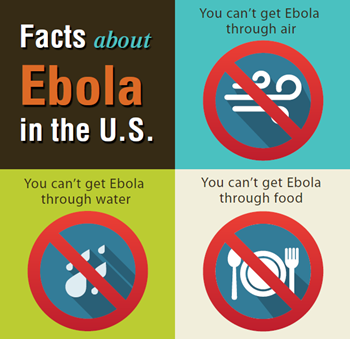According to the Centers for Disease Control (CDC), Ebola Virus is not a foodborne illness.
CDC Q&A on Ebola and Food Safety in the United States
CDC states that Ebola can be transmitted several ways:
- Ebola is spread through direct contact (through broken skin or mucous membranes in, for example, the eyes, nose, or mouth) with blood or body fluids (including but not limited to urine, saliva, sweat, feces, vomit, breast milk, and semen) of a person who is sick with Ebola.
- Ebola is spread through direct contact with objects (like needles and syringes) that have been contaminated with the virus; or infected animals.
- Ebola is not spread through the air or by water, or in general, by food.
RESOURCES FOR FOOD RETAILERS
In-Store Food Handling and Prevention
Food Safety Precautions and Protocols
- The food safety protocols food retailers have in place and the sanitation training from SafeMark will give associates the tools to help prevent contamination of food.
- Proper hygiene, including hand washing, is the single most effective tool in addition to glove use when handling ready-to-eat-foods.
- Ensure employees report symptoms to managers and do not work when sick.
- The presenting symptoms of Ebola – fever, diarrhea, vomiting and abdominal pain – are the same as for some foodborne illness and should be immediately reported to a retail manager.
- Employees should be encouraged and feel comfortable reporting to their managers if they feel ill.
- Note: Associates who have traveled to western Africa should follow the CDC’s travel warnings and monitor symptoms for a period of three weeks after returning to the U.S.
Information for Grocery Customers
Consistent Information to Share with Grocery Customers:
- According to CDC:
- Ebola is not a foodborne virus.
- Ebola is not like the flu; it is not respiratory and is not transmitted through air, food or water.
- One must come into close contact with the bodily fluids of a person exhibiting signs of Ebola in order to contract the virus.
- Similar to other viruses, Ebola can survive outside the body for a period of time, but it’s highly variable.
- Once someone recovers from Ebola, they can no longer spread the virus.
- Experts agree that Ebola is not foodborne and an outbreak in the U.S. is very unlikely.
Pharmacy Resources
Information for Pharmacy and Health Care Workers
- Symptoms of Ebola include (via CDC)
- Fever (greater than 101.5°F)
- Severe headache
- Muscle pain
- Weakness
- Diarrhea
- Vomiting
- Abdominal (stomach) pain
- Unexplained hemorrhage (bleeding or bruising)
- Symptoms may appear anywhere from 2 to 21 days after exposure to Ebola, but the average is 8 to 10 days. (via CDC)
- Recovery from Ebola depends on good, supportive clinical care and the patient’s immune response. People who recover from Ebola infection develop antibodies that last for at least 10 years. (via CDC)
- Ebola Treatment (via CDC)
- There are no approved treatments available for Ebola Virus Disease (EVD), but patients are being successfully treated with experimental drugs as this situation continues to unfold.
- There are no approved vaccines available for EVD. Several investigational Ebola vaccines are in development, and Phase I trials are underway for some vaccine candidates.
- Ebola Evaluation and Supportive Care (via CDC)
- Clinical management should focus on supportive care of complications, such as hypovolemia, electrolyte abnormalities, hematologic abnormalities, refractory shock, hypoxia, hemorrhage, septic shock, multi-organ failure, and DIC.
- Checklist for Patients Being Evaluated for EVD in the United States
- Algorithm for Evaluation of the Returned Traveler
- Additional information on evaluating patients for possible EVD
- RxResponse hosts information for health care professionals re: Ebola. Resources can be found on the RxResponse Ebola Resources page.
Ebola Workplace Considerations
FMI can help food retail members identify outside legal counsel. Contact Stephanie Barnes for legal resources.
GENERAL EBOLA INFORMATION SOURCES
Primary Resources on Ebola
Centers for Disease Control and Prevention (CDC) provides real-time information and updates.
The World Health Organization (WHO) offers information on ebola and food safety.
- Additional Links
- Food and Agriculture Organization of the United Nations
- U.S. Department of State
- U.S. Department of Health and Human Services
- World Health Organization (WHO)
- National Consumers Leaguewarns that fraud could be on the rise due to Ebola fears.
- European Food Safety Authority Report provides an update on the risk of transmission of Ebola virus (EBOV) via the food chain
- International Union of Food Science and Technology Scientific Information Bulletin shares important aspects for the food science and technology community
- Food Safety & Security
 Industry Topics address your specific area of expertise with resources, reports, events and more.
Industry Topics address your specific area of expertise with resources, reports, events and more.
 Our Research covers consumer behavior and retail operation benchmarks so you can make informed business decisions.
Our Research covers consumer behavior and retail operation benchmarks so you can make informed business decisions.
 Events and Education including online and in-person help you advance your food retail career.
Events and Education including online and in-person help you advance your food retail career.
 Food Safety training, resources and guidance that help you create a company food safety culture.
Food Safety training, resources and guidance that help you create a company food safety culture.
 Government Affairs work — federal and state — on the latest food industry policy, regulatory and legislative issues.
Government Affairs work — federal and state — on the latest food industry policy, regulatory and legislative issues.
 Get Involved. From industry awards to newsletters and committees, these resources help you take advantage of your membership.
Get Involved. From industry awards to newsletters and committees, these resources help you take advantage of your membership.
 Best practices, guidance documents, infographics, signage and more for the food industry on the COVID-19 pandemic.
Best practices, guidance documents, infographics, signage and more for the food industry on the COVID-19 pandemic.
